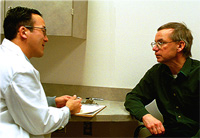Is Homeopathy Safe?
Homeopathy heals through natural processes, but that does not mean it cannot do harm.
 Treatment for anything but brief, acute issues should always be directed by a trained practitioner. Homeopathic remedies act deeply and powerfully and need to be used with respect. For example:
Treatment for anything but brief, acute issues should always be directed by a trained practitioner. Homeopathic remedies act deeply and powerfully and need to be used with respect. For example:
- Inappropriate or multiple remedies can cause problems. A wrong remedy, or one repeated too frequently for too long can begin to cause symptoms or "a proving." Combination remedies can confuse the treatment situation, and the remedies not indicated for the particular situation can cause proving symptoms.
- Homeopathic remedies may aggravate a pre-existing condition: indeed, aggravations can be a sign that the remedy was correctly chosen. Aggravations are usually mild and brief, however, even mild aggravations can be serious, especially in a person with a weak vital force or who has serious disease, so caution must be demonstrated.
- A severe aggravation is sometimes called a healing crisis. The remedy is correctly chosen, but may be given at a dose or frequency that causes the flare up of symptoms, on some level, that may feel like too much for the person to handle. Too great or too sudden disruption of the individual's vital force canhave detrimental results. That is why it is crucial to be working with a professional who can help minimize these occurrences and manage such reactions safely.
That said, it is important to compare the higher risk of conventional pharmaceuticals--both with side effects and symptom suppression-- to the smaller risk of transient aggravation that may occur with homeopathic remedies.
Are there any concerns about contamination?
Homeopathic remedies, like anything an individual takes into their body, must be uncontaminated and accurately produced and labeled. Homeopathic pharmacies work with the FDA to ensure quality and uncontaminated production of homeopathic medicines.
 The Homeopathic Pharmacopoeia Convention also meets regularly with U.S. government officials to set standards and procedures for Good Laboratory Practices. Homeopathic products should be labeled to acknowledge they are prepared in accordance with these standards.
The Homeopathic Pharmacopoeia Convention also meets regularly with U.S. government officials to set standards and procedures for Good Laboratory Practices. Homeopathic products should be labeled to acknowledge they are prepared in accordance with these standards.
Any controlled substance, or regulated pharmaceutical, may be made into a homeopathic remedy through the collaboration of a licensed prescriber and a regulated homeopathic pharmacy. However it can only be prescribed for a client by someone with a license from the Drug Enforcement Agency, which usually means a physician or nurse practitioner. Other prepared homeopathic medicines are considered safe for over-the-counter use, per the Food, Drug, and Cosmetic Act of 1939.
Are there any other concerns?
Other safety issues arise if the patient has not had the proper homeopathic diagnosis and receives an incorrect or unnecessary treatment, or if a patient defers necessary life-saving medical intervention to use homeopathy alone. For example, a person having acute, left-sided chest pain, radiating down the arm, suggestive of an acute heart attack, may choose to quickly take a homeopathic remedy on the advice of their practitioner, but should still call 911 and receive conventional medical care.